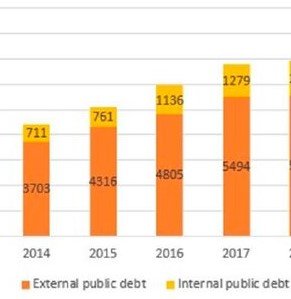The annual inflation rate in Georgia reached 0.3% in October 2024, according to the National Statistics Office (Geostat), signaling subtle but steady changes in consumer prices. While the overall figure remains modest, the data reveals significant sector-specific shifts, most notably in restaurants, hotels, and education. Core inflation—excluding volatile categories like food and energy—rose by 1.2%, reflecting underlying price pressures that may impact the broader economy in the months to come.
Restaurants and Hotels See the Steepest Rise
A major driver of October’s inflation was the cost surge in restaurants and hotels, with prices in this sector increasing by 7.6%. These rising costs primarily stemmed from accommodation services, which soared by 10.4%, and catering, up by 6.8%. Altogether, this category contributed a 0.26 percentage point boost to the overall inflation rate.
With more people dining out and traveling post-pandemic, demand for accommodation and food services has escalated, creating a ripple effect on pricing. The industry is grappling with increased operational expenses, particularly labor costs and supply chain disruptions, which have been passed on to consumers. While some view this as a post-lockdown normalization, others are concerned about the affordability of these services, especially for low-income households.

Education Costs Climb, Adding to Financial Pressure
The education sector also recorded a notable 5% increase in costs, contributing 0.25 percentage points to the inflation rate. This rise impacts families across Georgia, as tuition fees and educational materials become more expensive. These hikes reflect not just inflation but a broader trend toward increased investment in educational infrastructure, potentially aiming to improve the quality of services.
In recent years, the cost of education in Georgia has become a growing concern for households, with private schools, universities, and after-school programs pushing up their fees. Families are feeling the strain, particularly those with multiple school-age children. For many, the rising cost of education is creating a challenging environment that may require careful financial planning.
Other Products and Services Show Mixed Trends
Other services and products, a category covering personal effects and insurance, saw a price increase of 5.8%, contributing 0.3 percentage points to the annual inflation rate. This category’s most significant price hikes were seen in:
- Personal effects: Items in this segment rose by an astonishing 24.5%, reflecting a shift in demand as consumers seek products like jewelry, watches, and other personal items.
- Insurance: The cost of insurance surged by 12.9%, a figure driven by both increased demand for coverage and rising operating costs in the insurance sector.
These increases reflect a variety of factors. On the one hand, there’s a heightened consumer interest in luxury and personal goods, driven by a post-pandemic focus on self-care and enjoyment. On the other, the insurance industry faces challenges, including rising healthcare and vehicle repair costs, which have, in turn, been passed on to consumers through higher premiums.
What Does This Mean for Georgia’s Economy?
The current inflation rate may be low by international standards, but Georgia’s economy is still feeling the effects of these sector-specific changes. The fact that core inflation rose by 1.2% suggests that there are underlying pressures in the economy beyond what is captured in the overall inflation rate. This could have implications for both consumers and policymakers as they navigate an increasingly complex economic landscape.
The ongoing increases in restaurants, hotels, and educational expenses signal a potential challenge for policymakers. To some, the rise in these prices indicates a recovering, resilient economy, while others worry that continued price hikes could put essential services out of reach for some citizens. The Bank of Georgia and government authorities may consider these trends when setting future economic policies, especially if inflationary pressures continue to mount.
